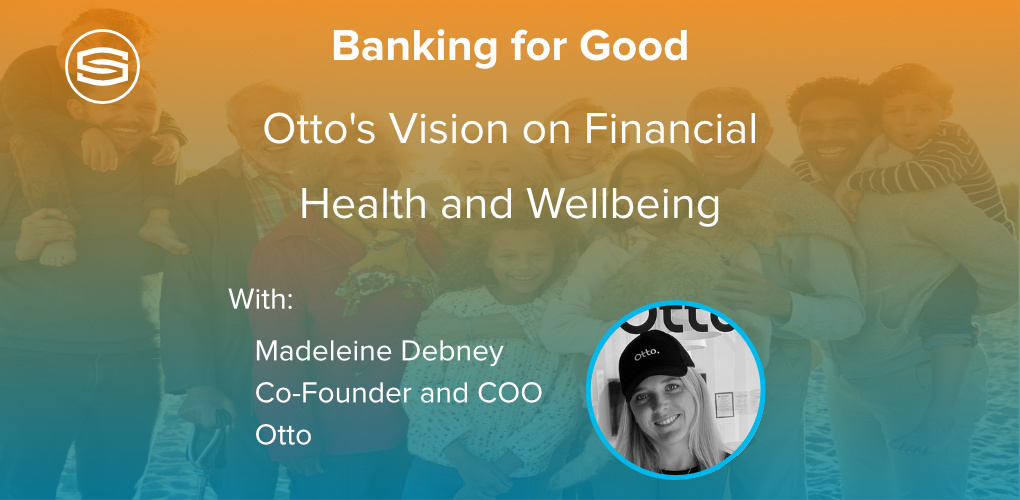
Insights & Opinions
Otto's Vision on Financial Health and Wellbeing
Tue, 01 Feb 2022


Last week, we invited Madeleine Debney, COO and Co-Founder of Otto, a financial health platform. Reflecting on the lack of financial education in schools, Madeleine and her co-founders came up with a platform to help people improve their financial health.
As usual, there are a few lessons I'd like to you remember:
- Improving financial health is not the same as fighting poverty
- Preventing financial stress requires periodic check-ups and lots of education
- Financial service cannot solve the problem alone, neither can FinTech
I'll explain what I mean by that, but first, let me share what Otto is about.
A unique approach to financial health
Otto's mission is "to help you reach your goals, keep track of your accounts and receive exceptional guidance from our world-class partners."
Madeleine: "When you compare financial wellness or physical and mental wellness and wellbeing, you see there are many synergies, and you see that they are also completely related. We find at Otto that there's so much attention on physical and now mental health and yet financial health doesn't have that same kind of gravitas."
Their going-in position is someone’s employment situation. From there on, they build a holistic view of a person's possibilities and how it matches with their desires and dreams. They positioned Otto at employers to improve their competitive advantage in an incredibly competitive labour market. Initially a B2B2C player, they now also provide B2C services, making their ‘C’ customers ambassadors at their employers.
Improving financial health is not the same as fighting poverty
One of the dilemmas we discussed was whether financial wellness, financial wellbeing and fighting poverty are part of the same debate.
In fact, they are not.
Let’s make the distinction between financial wellness and financial wellbeing first. Erin Taylor explained it wonderfully: "Wellness is a practice, and wellbeing is a state". “
Financial wellbeing is more personal”, explained Madeleine. "You could have the same financial life as the person next to you and have a different wellbeing because your drivers are different."
"Financial health and wellness are a bit more conceptual", she added. "But ultimately, it boils down to the same thing: Do you feel in control of your finances? Do you feel like your finances are enabling the life that you want to live rather than being a massive cause of stress within your life?"
One could argue if banks do a good job providing customers loyalty programs or discounts to save a few dollars in their mission to improve someone's health. Financial wellbeing is not about that. Financial wellbeing is much more about someone's emotions, behaviours and aspirations to money as it is to the quantitative aspects of it.
Because it isn’t a static concept, financial wellbeing doesn't have an end, explained Madeleine: "There is not being 100% physically healthy, like there is not being 100% financially healthy. When you get to the next level of anything, of any discipline, you see a whole new world as well. So I don't think it's something that ends; I think it's that has natural ebbs and flows as you go through life and natural challenges."
Periodic check-ups and lots of education to prevent financial stress
A doctor is there to diagnose a problem, comfort you that everything will end up fine, and perhaps give you some rest to recover. Your financial advisor should be there on crucial life moments as well.
That is also what Otto provides. Their coaches make periodic evaluations to comfort customers and give timely advice when a behavioural change is needed.
Yet, most of the work goes into financial education, helping customers understand their situation, which products they invested in, and how this may impact their life today and pension later on, for example.
Madeleine: "Financial education is completely imperative to our entire business model. A lot of the education that we offer, we endeavour to offer it for free. That is a big part of how our scaling plan is. We have services that are paid for, and that helps us subsidise the educational services that are free."
Financial service cannot solve the problem alone, neither can FinTech
Another message I retain from this session is the following statement of Madeleine: "Every finance vertical has a responsibility around financial health. Banks, for example, have to be responsible for the products they sell ultimately to consumers."
Banks cannot solve the entire problem of financial stress because they don't always have a completely holistic view of a client. They might, of course, with a bit of work, but only after they overcome another challenge: the conflict of interest.
What is more important for a bank: the profits of selling a product or the long-term financial situation of the client? Horrifying stories from the past, and still today, have shown that, unfortunately, not every bank takes the client's improved long-term financial situation for granted.
A banker in the audience pointed to the responsibility of a bank to explain things clearly.
Don't underestimate this role because finance is messy sometimes and complex to explain. Yet, even if someone can afford a mortgage, they also need to understand the impact of this long-term commitment.
That is difficult to do.
Community-based education was another key takeaway for me. People look at like-minded people to find answers to their questions. That is why platforms like Reddit, Discord and Telegram became so popular, and why companies like Female Invest are so successful. They speak the language of their audience.
"I think the newer banks do a great job at providing a new benchmark, a new hygiene level of how you interact with a bank and how you display data, what you expect from your bank and is the bank working for you as much as you work into them, a bit more of an equal relationship", observed Madeleine.
FinTech companies with the noble mission to fight financial stress, without the conflict of interest cannot solve the problem alone either. They need banks to help them. Open Banking allows connections with the right organisations to provide the required data. For Otto, MoneyHub opens the gates to financial data through APIs, or people can complete the data manually.
Of course, also the government has an important responsibility, as someone in the audience rightfully noted. They have control over the school curriculum, and in case things go wrong, the government should provide the right safety nets to help people overcome financial problems.
Conclusion
Financial wellbeing is an ecosystem play. I don’t like to use the word too often, but ‘ecosystem’ makes complete sense to me in this context. Because of the variety of organisations and people that have their role to play to make the financial life of people, and the life, in general, less stressful and healthier.
The way Otto tries to make a difference was eye-opening to me, and I look forward to reading how their journey continues in the years to come.



